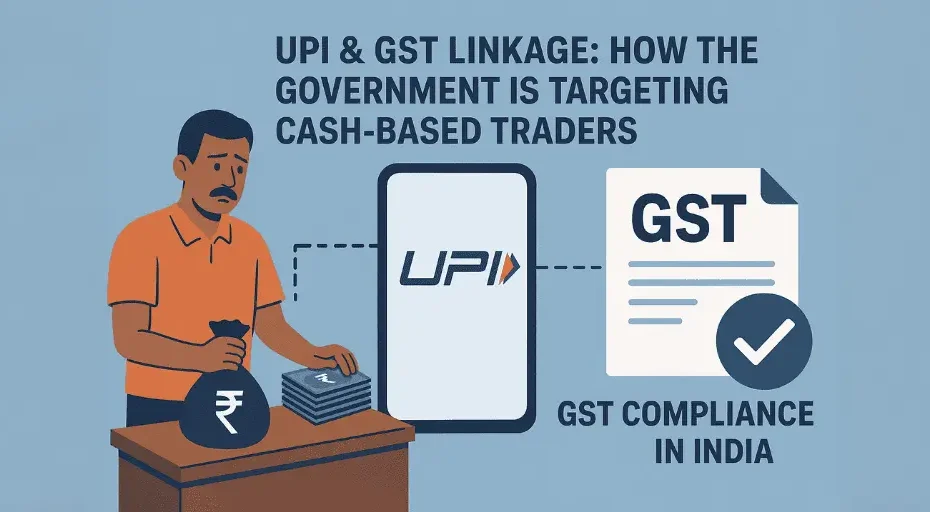UPI & GST Linkage: How the Government Is Targeting Cash-Based Traders
In recent years, India has witnessed a massive digital transformation, with Unified Payments Interface (UPI) at the center of this revolution. At the same time, the Goods and Services Tax (GST) regime has reshaped how businesses report and pay taxes. Now, the government is increasingly linking UPI transactions with GST records to ensure GST compliance in India and crack down on cash-based traders who often evade taxes. This move has wide-ranging implications for businesses, traders, and the overall economy.
The Rise of UPI in India
UPI has become the backbone of India’s digital payment ecosystem. From small kirana shops to large e-commerce platforms, UPI transactions have made payments quick, seamless, and traceable. According to official data, UPI processed over 10 billion transactions in a single month in 2023, showcasing the sheer scale of its adoption.
This level of transparency is precisely what makes UPI an effective tool for ensuring GST compliance in India. By monitoring digital transactions, the government can match sales data with GST filings, making it harder for businesses to underreport income.
Why Link UPI with GST?
One of the biggest challenges with GST compliance in India is the prevalence of cash transactions. Many small traders and businesses prefer dealing in cash to avoid reporting sales, thereby evading taxes. By linking UPI transactions with GST, the government gets direct access to real-time, verifiable sales data.
Here are some key reasons for this move:
Curbing Tax Evasion: Cash-based businesses often avoid issuing bills, leading to underreporting of sales. Linking UPI ensures accurate reporting.
Increasing Transparency: Digital payments create an audit trail that can be matched with GST returns.
Boosting Revenue: Improved GST compliance in India means more tax collections, which strengthens the economy.
Encouraging Digital Economy: It promotes the use of digital payments, reducing reliance on cash.
How the Government Targets Cash-Based Traders
The government is focusing on sectors where cash dealings are high, such as retail, real estate, and small trading businesses. By analyzing mismatches between UPI data and GST filings, authorities can identify suspicious traders.
For example:
A trader accepting large amounts through UPI but declaring low sales in GST returns may come under scrutiny.
If a business reports consistent sales in cash but has negligible digital transactions, it raises a red flag.
This systematic approach ensures better GST compliance in India and minimizes loopholes exploited by cash-based traders.
Impact on Small Businesses
While some traders see this as government overreach, there are long-term benefits:
Level Playing Field: Honest businesses no longer face unfair competition from tax-evading traders.
Access to Credit: Digital records through UPI and proper GST compliance in India help small businesses secure loans from banks and NBFCs.
Reduced Harassment: Automated systems reduce manual inspections and corruption.
However, traders must adapt quickly. Businesses heavily dependent on cash transactions may struggle if they do not embrace digital methods and proper GST reporting.
Benefits of GST Compliance in India
The government’s push for UPI and GST integration reflects a larger vision of a transparent and digital-first economy. The benefits include:
Better Business Reputation: Businesses maintaining proper records and ensuring GST compliance in India gain credibility with customers, banks, and suppliers.
Government Incentives: Several schemes reward digital adoption and prompt GST filing.
Ease of Doing Business: Automated reconciliation between UPI data and GST returns simplifies compliance.
Boost to Formal Economy: More businesses enter the tax net, widening the base and lowering tax rates in the long run.
Challenges in Implementation
Despite the advantages, there are some hurdles:
Privacy Concerns: Traders worry about excessive monitoring of financial data.
Technical Integration: Ensuring smooth data sharing between UPI platforms and GSTN (Goods and Services Tax Network) requires advanced infrastructure.
Resistance from Small Traders: Many small traders, especially in semi-urban and rural areas, still prefer cash.
Addressing these challenges is crucial to making this initiative successful while ensuring balanced enforcement of GST compliance in India.
Future Outlook
The future of GST compliance in India is closely tied to digital payments. As UPI continues to grow, the government is likely to expand its integration with tax systems further. Advanced technologies such as Artificial Intelligence (AI) and data analytics will play a critical role in identifying discrepancies and targeting evasion more effectively.
In the coming years, we can expect:
AI-based Monitoring: Automated systems will flag unusual patterns in UPI transactions compared to GST filings.
Broader Integration: Other payment modes, including credit cards and wallets, may also be linked to GST.
Reduced Manual Intervention: A digital-first compliance system will reduce human errors and corruption.
Conclusion
The linkage between UPI and GST is a strategic step toward improving GST compliance in India and discouraging cash-based transactions. While it may seem challenging for traditional businesses, the long-term benefits of transparency, efficiency, and economic growth far outweigh the drawbacks. For traders, the message is clear: embrace digital payments, ensure proper GST filing, and thrive in a fairer marketplace.
As India continues to strengthen its digital economy, GST compliance in India will not just be a regulatory requirement but also a pathway to growth and sustainability.
Our GST Services

All E-commerce Tax services
E-commerce tax services help online sellers navigate GST registration, compliance, return filing, TCS management, tax planning, and audits, ensuring efficient tax management and legal compliance.

GST Filing
GST filing is the process of submitting tax returns to the government, detailing sales, purchases, and taxes paid or collected, ensuring compliance with GST laws.

GST Registration
GST registration is the process where businesses obtain a GSTIN from the government, allowing them to collect taxes, claim input tax credits, and comply with GST laws.





